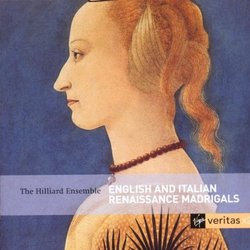| All Artists: Giovanni Giacomo Gastoldi, Antonio Caprioli, Loyset Compère, Philippe Verdelot, Jacques Arcadelt, Francesco Patavino, Maddalena Casulana, Luca Marenzio, Cipriano de Rore, Giovanni Domenico del Giovane da Nola, Adrian Willaert, Vincenzo Bellavere, Orlande de Lassus, Thomas Morley, Thomas Weelkes, John Wilbye, John [Composer] Bennet, Orlando Gibbons, Thomas Tomkins, John Ward Title: English and Italian Renaissance Madrigals Members Wishing: 1 Total Copies: 0 Label: EMI Classics Release Date: 4/11/2000 Genres: Dance & Electronic, Special Interest, Pop, Classical Styles: Vocal Pop, Opera & Classical Vocal, Chamber Music, Historical Periods, Baroque (c.1600-1750), Renaissance (c.1450-1600) Number of Discs: 2 SwapaCD Credits: 2 UPCs: 724356167124, 724356167155, 072435616712 |
Search - Giovanni Giacomo Gastoldi, Antonio Caprioli, Loyset Compère :: English and Italian Renaissance Madrigals
 | Giovanni Giacomo Gastoldi, Antonio Caprioli, Loyset Compère English and Italian Renaissance Madrigals Genres: Dance & Electronic, Special Interest, Pop, Classical |
Larger Image |
CD Details |
CD ReviewsNot stilted but powerfully alive Caterina Sforza | Brooklyn, NY | 02/23/2005 (5 out of 5 stars) "My idea of stilted is to sing these madrigals in the phony, glee-club RP style endured for so many years, that made precious, quaint curiosities of them. The Elizabethan pronunciation on this CD is an eye and ear-opener. We may appreciate how much of that speech actually endures in regional accents in both the US and UK. More importantly, this CD brings us the sounds of the long-forgotten English human beings of the Renaissance, people who drank, fought and screwed, who brought us Shakespeare and the King James Bible. I love this recording." Happy Happy Singers We! Giordano Bruno | Wherever I am, I am. | 12/04/2008 (5 out of 5 stars) ""Then broadside to broadside and at it they went, for fully two hours or three," the good ships Madrigal and Madrigale, head to head the English and the Italian, nor would either yield until the last quaver... It's not a fair battle of course, a handful of English composers against the whole continent. Of the composers of these "Italian" madrigals, only six are bona fide Italiani. Compere, Verdelot, Arcadelt, da Rore, Willaert, Bell'Haver, and di Lasso are all French or Flemish. Likewise, the majority of these Italian "madrigals" aren't madrigals at all in their contemporary sense; they are villanelle or canzonette, the light-hearted less polyphonic little sisters of the mature madrigali. The two CDs in this box were recorded four years apart. The Italian CD features only the male voices listed in the notes, with countertenor David James singing treble, The English CD includes sopranos Lynne Dawson and Gillian Fisher; I hate to concede it but the mixed ensemble has a more pleasing blend of voices, and the English madrigals profit from it. However, the French and Italian composers included here have a much larger battery of harmonic and rhythmic resources. If the "big guns" of the true Italian madrigalists - Luzzaschi, Gesualdo, Monteverdi, Palestrina, d'India - were included the English barques would be sunk in a trice. The English madrigalists tended to write jolly jouncy fa-la-la ditties, with the exception on this disk of the ambitious "O Care Thou Wilt Dispatch Me" by Thomas Weelkes. Jolly music is not to be scorned; there's a good deal of art and wit in these seemingly innocent pieces. John Wilbye's "Sweet Honey Sucking Bees" is one of the slyest metaphors of amorous climax in all of music, and the Hilliards make that climactic metaphor lushly obvious. The Parisian composers Verdelot and Arcadelt were major innovators in the genre of the "chanson" and their Italian-language madrigals manage to sound quite French. Judging by these two CDs, the English composers learned more of their musical vocabulary from the French than from the Italians. Several of the Italian selections are properly "carnival" music, particularly those by the Neapolitan Giovan Domenico da Nola. Such pieces are often comedic, in the spirit of puppet-show commedia dell'arte. The well-known "Matona Mia Cara" by Orlando di Lasso is a hilarious mockery of the accent and manner of a German mercenary trying to serenade an Italian 'Madonna.' This is music for frolics and flirtations, sweet honey sucking moments, patio parties and wedding receptions in modern terms. The Hilliards do it very well. Another reviewer declares querulously that the Ensemble Giles Binchois does it better; that may be so, but this 2-CD package is a unique selection. I do have one grave complaint, for which many buyers might want to deduct a star from my rating. There are no texts! Listening veeery closely, you may be able to follow the English, but the Italian is difficult even for paesani, since much of it is dialect humor. It's nice to have these bargain-price re-releases from Virgin Veritas, but not to include texts with a selection of witty songs like these is miserly." Better at Italian than English Uncle Odie | Somewhere on the Coast of California | 07/25/2003 (3 out of 5 stars) "A stilted style and even more stilted attempts at Renaissance-English pronunciation make the English Madrigal disk a terrible disappointment. All emotional content -- the mellow, lumimous melancholy with flashes of fire that characterizes English music at its best -- has been drained in this attempt to kill, skin, and stuff these madrigals in order to present them as museum pieces. The pronunciation problem is particularly galling -- if these songs are going to be made incomprehensible to modern English speakers, where, then, is their cultural home? The Italian pieces are presentable, enjoyable, and sung with delicacy and a fine sense of the artifice of the Italian madrigal. Although this recording can be moving, these pieces are performed more with reverence than with love. These are well worth hearing, but the French ensembles sing these with a bit more feeling. Try, say, Ensemble Clément Janequin."
|
